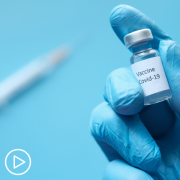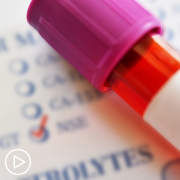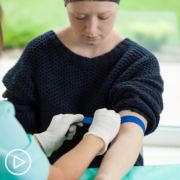How Can You Engage in Your CLL Care?
How Can You Engage in Your CLL Care? from Patient Empowerment Network on Vimeo.
How can chronic lymphocytic leukemia (CLL) patients become more engaged in their care? Dr. Paul Barr explains steps that patients can take to activate shared decision-making with their provider for optimal care.
Dr. Paul Barr is Professor of Hematology/Oncology at University of Rochester Medical Center. Learn more about Dr. Barr, here.
Related Resources:

|

|
Transcript:
Katherine:
We’ve been hearing a lot about shared decision-making lately. In your opinion, how is this concept best put into practice?
Dr. Barr:
So, I honestly think shared decision-making is not just useless term. This is something we actually really use in our clinics, and it’s very important for the care of CLL patients, where we have patients who do very well for a long period of time. And there are a lot of different management decisions and a variety of treatment options that we have to discuss.
So, when we have that luxury, it’s really important to help educate patients on the different options and to better understand what their goals of care are, so they can help us decide what’s best for them. When we’re deciding just, one example is that, when we’re deciding on various treatments, we can use agents that are given orally, taken at home, but patients may be on them for many years.
Alternatively, we have fixed duration regimens, but may involve trips to the infusion center. And a lot of these different treatments all work very well. So, involving the patient in that decision making process, makes the process that much easier for the patient and enables you just to take better care of them over the long run.
Katherine:
What is the role of the patient to making treatment decisions?
Dr. Barr:
Well, I think that the role of the patient is really to be their own advocate. Take all the information and then, help us make decisions together. And to just be very honest about what they want from, not just a simple decision about a treatment, but from their overall care. To really just to be as involved as possible and to make sure all of their concerns are heard, all of their questions are answered.
Katherine:
For those who might have trouble speaking up for themselves, what advice do you have for them?
Dr. Barr:
Oh, I would say, especially for our patients with CLL, often there are many,
many appointments along the way, where there may not be urgent decisions being made and there are opportunities to slowly learn more to ask questions. So, as much as possible, try not to be intimidated by that visit to the cancer center, which obviously can be anxiety provoking, but to develop a relationship with your hematologist, your oncologist, your care team so, that they can take better care of you.
I honestly think it works best when you slowly get to know your team, understand the field, some of the decisions that need to be made and that the team only wants what’s best for you. So, yeah, I honestly think it’s – think of it as a process. It’s not a one-time visit where you have to get everything out and get everything answered. It should be a relationship.








